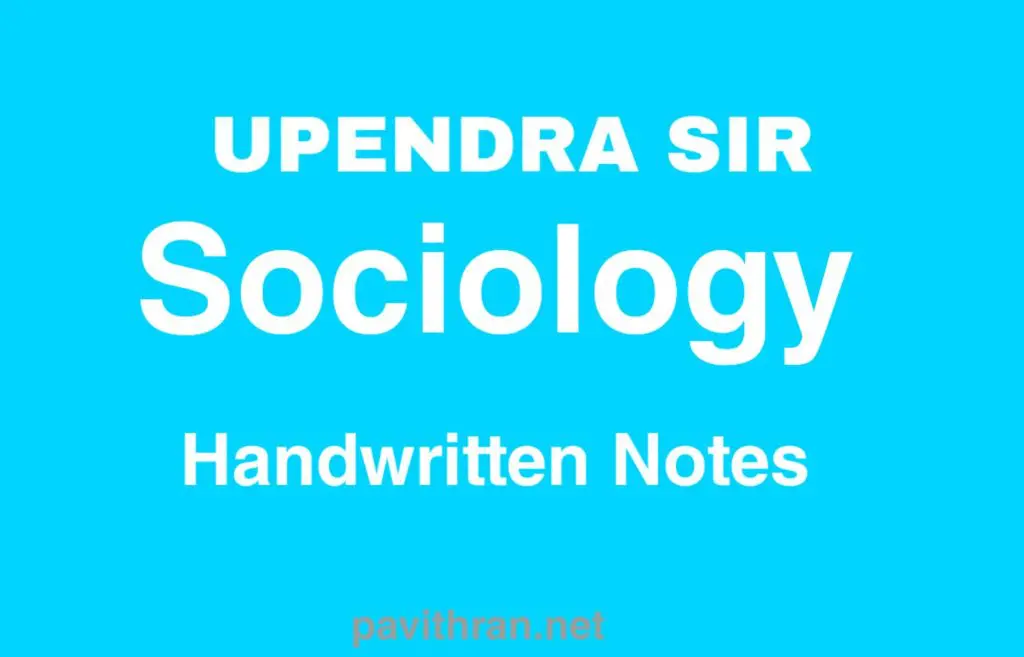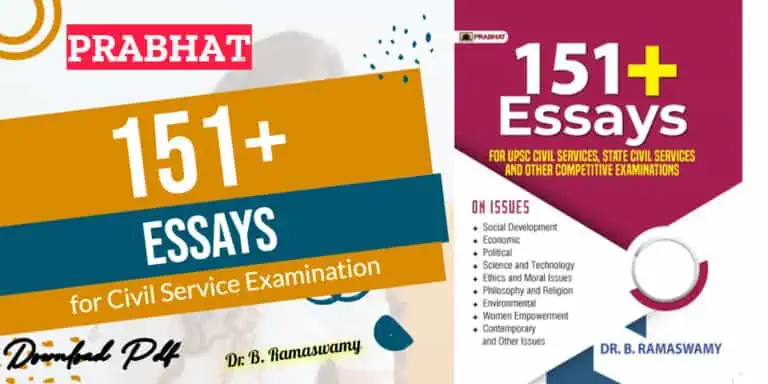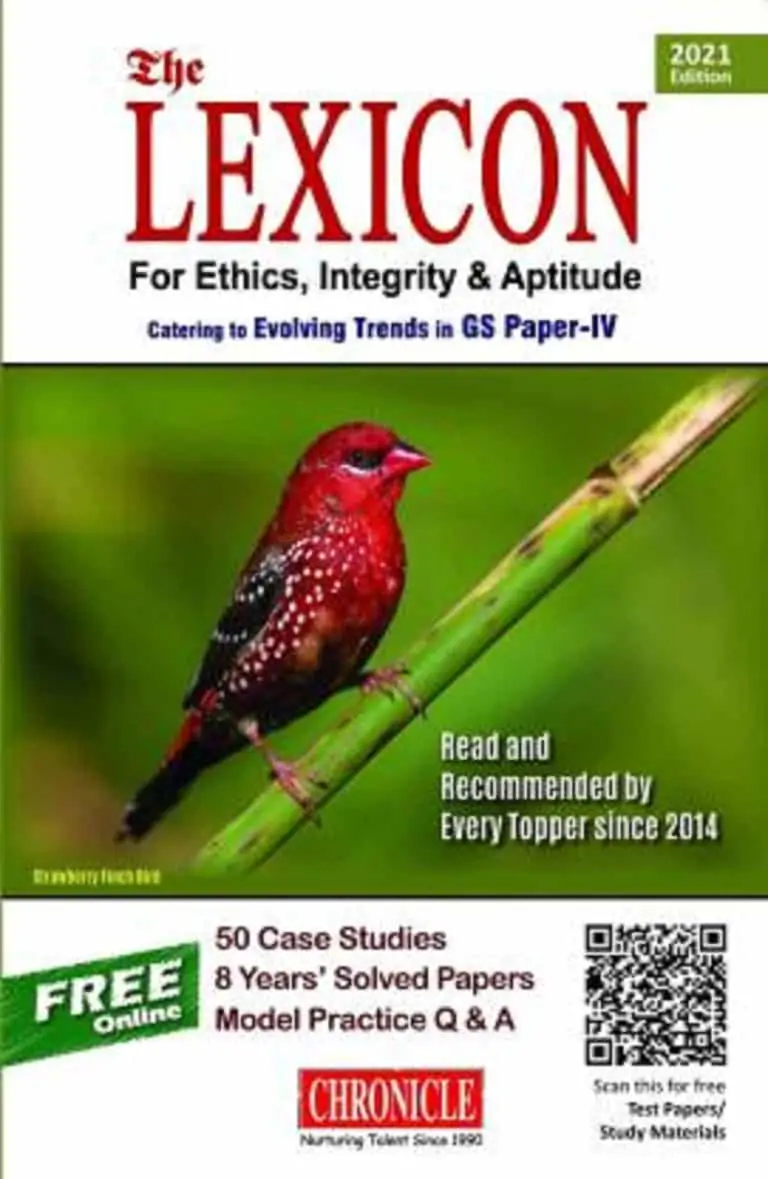Upendra sir sociology Handwritten Notes PDF Free Download
Upendra sir Sociology Handwritten Notes
upendra sir sociology handwritten notes pdf free download is the Extensive and Comprehensive Notes prepared by Upendra Sir. These Class notes by Upendra Sir for Sociology is in English Language and it makes you finish it within a month if you study hard.

Sociology Syllabus for UPSC Main Examination
Paper-I
Fundamentals of sociology
- Sociology – The Discipline:
(a) Modernity and social changes in Europe and emergence of Sociology.
(b) Scope of the subject and comparison with other social sciences.
(c) Sociology and common sense. - Sociology as Science:
(a) Science, scientific method and critique.
(b) Major theoretical strands of research methodology.
(c) Positivism and its critique.
(d) Fact value and objectivity.
(e) Non-positivist methodologies. - Research Methods and Analysis:
(a) Qualitative and quantitative methods.
(b) Techniques of data collection.
(c ) Variables, sampling, hypothesis, reliability and validity. - Sociological Thinkers:
(a) Karl Marx – Historical materialism, mode of production, alienation, class struggle.
(b) Emile Durkhteim – Division of labour, social fact, suicide, religion and society.
(c) Max Weber – Social action, ideal types, authority, bureaucracy, protestant ethic and the
spirit of capitalism.
(d) Talcolt Parsons – Social system, pattern variables.
(e) Robert K. Merton – Latent and manifest functions, conformity and deviance, reference
groups.
(f) Mead – Self and identity. - Stratification and Mobility :
(a) Concepts – equality, inequality, hierarchy, exclusion, poverty and deprivation.
(b) Theories of social stratification – Structural functionalist theory, Marxist theory, Weberian
theory.
(c) Dimensions – Social stratification of class, status groups, gender, ethnicity and race.
(d) Social mobility – open and closed systems, types of mobility, sources and causes of mobility. - Works and Economic Life:
(a) Social organization of work in different types of
society – slave society, feudal society, industrial capitalist society
(b) Formal and informal organization of work.
(c) Labour and society.
3 - Politics and Society:
(a) Sociological theories of power.
(b) Power elite, bureaucracy, pressure groups and political parties.
(c) Nation, state, citizenship, democracy, civil society, ideology.
(d) Protest, agitation, social movements, collective action, revolution. - Religion and Society:
(a) Sociological theories of religion.
(b) Types of religious practices: animism, monism, pluralism, sects, cults.
(c) Religion in modern society: religion and science, secularization, religious revivalism, fundamentalism. - Systems of Kinship:
(a) Family, household, marriage.
(b) Types and forms of family.
(c) Lineage and descent.
(d) Patriarchy and the sexual division of labour.
(e) Contemporary trends. - Social Change in Modern Society:
(a) Sociological theories of social change.
(b) Development and dependency.
(c) Agents of social change.
(d) Education and social change.
(e) Science, technology and social change.
Paper-II
Indian Society: Structure And Change
A. Introducing Indian Society:
(i) Perspectives on the Study of Indian Society :
(a) Indology (G.S. Ghure).
(b) Structural functionalism (M. N. Srinivas).
(c) Marxist sociology (A. R. Desai).
(ii) Impact of colonial rule on Indian society :
(a) Social background of Indian nationalism.
(b) Modernization of Indian tradition.
(c) Protests and movements during the colonial period.
(d) Social reforms.
B. Social Structure:
(i) Rural and Agrarian Social Structure:
(a) The idea of Indian village and village studies.
(b) Agrarian social structure— the evolution of land tenure system, land reforms.
(ii) Caste System:
(a) Perspectives on the study of caste systems: G. S. Ghurye, M. N. Srinivas, Louis Dumont, Andre Beteille.
(b) Features of the caste system.
(c) Untouchability-forms and perspectives
(iii) Tribal Communities in India:
(a) Definitional problems.
(b) Geographical spread.
(c) Colonial policies and tribes.
(d) Issues of integration and autonomy.
(iv) Social Classes in India:
(a) Agrarian class structure.
(b) Industrial class structure.
(c) Middle classes in India.
(v) Systems of Kinship in India
(a) Lineage and descent in India.
(b) Types of kinship systems.
(c) Family and marriage in India.
(d) Household dimensions of the family.
(e) Patriarchy, entitlements and the sexual division of labour.
(vi) Religion and Society :
(a) Religious communities in India.
(b) Problems of religious minorities.
C. Social Changes in India:
(i) Visions of Social Change in India:
(a) Idea of development planning and a mixed economy.
(b) Constitution, law and social change.
(c) Education and social change.
(ii) Rural and Agrarian Transformation in India:
(a) Programmes of rural development, Community Development Programme, cooperatives, poverty alleviation schemes.
(b) Green revolution and social change.
(c) Changing modes of production in Indian agriculture.
(d) Problems of rural labour, bondage, migration.
(iii) Industrialization and Urbanisation in India:
(a) Evolution of the modern industry in India
(b) Growth of urban settlements in India.
(c) Working class: structure, growth, class mobilization.
(d) Informal sector, child labour.
(e) Slums and deprivation in urban areas.
(iv) Politics and Society :
(a) Nation, democracy and citizenship.
(b) Political parties, pressure groups, social and political elite.
(c) Regionalism and decentralization of power.
(d) Secularization.
(v) Social Movements in Modern India :
(a) Peasants and farmers movements
(b) Women’s movement.
(c) Backward classes & Dalit movements.
(d) Environmental movements.
(e) Ethnicity and Identity movements.
(vi) Population Dynamics :
(a) Population size, growth, composition and distribution.
(b) Components of population growth: birth, death, migration.
(c) Population Policy and family planning.
(d) Emerging issues: ageing, sex ratios, child and infant mortality, reproductive health.
(vii) Challenges of Social Transformation :
(a) Crisis of development: displacement, environmental problems and sustainability.
(b) Poverty, deprivation and inequalities.
(c) Violence against women.
(d) Caste conflicts.
(e) Ethnic conflicts, communalism, religious revivalism.
(f) Illiteracy and disparities in education.
▱▰▱▰▱▰▱▰▱▰▱▰▱▰▱
| BOOK NAME: | Upendra Sir Sociology pdf download |
| AUTHOR: | Upendra Sir |
| LANGUAGE: | English |
| FILE FORMAT: | PDF, Kindle edition |
| PDF SIZE: | 7MB |
Volume-1 PDF PREVIEW:-
RELATED POST: Download World Atlas Map in PDF
Download Sociology Volume 1 for Paper-1 in UPSC Exams from the above link
Volume-2 PDF PREVIEW:-
Download Sociology Volume 2 for Paper-2 in UPSC Exams from the above link
[PDF] Other Important Study Materials for Sociology
NCERT Books are the main Study guide for Central Government exams as well as UPSC exams. It is the Primary source material from which most of the questions asked in Civil service exams.
| NCERT Class 11 Introducing Sociology | Download PDF |
| NCERT Class 11 Understanding Society | Download PDF |
| NCERT Class 12 Indian Society | Download PDF |
| NCERT Class 12 Social Change & Development in India | Download PDF |
▱▰▱▰▱▰▱▰▱▰▱▰▱▰▱
Sociology Class Notes of P.Upendra Sir For IAS Mains In English Medium

| Book Name: | Essential Sociology – For Civil Services Main Examination |
| Author: | Smart Publisher |
| Publisher: | P. Upendra Sir |
| ASIN: | B07SXBBDR7 |
| Available Format: | Paperback only |
Sociology Class Notes of P.Upendra Sir For IAS Mains In English Medium is a complete set of 4 spiral bound booklets. Best Buy them if you don’t have time to prepare for Sociology. As it is more like a Class Notes covers important and crucial concepts and FAQs with great explanations.
READ MORE: Public Administration UPSC Syllabus in English
Buy Latest Edition of Essential Sociology – For Civil Services Main Examination from Amazon:
Essential Sociology – For Civil Services Main Examination Book is one of the Best-selling Books for UPSC preparation as it covers in-depth content about Sociology. If you are preparing for UPSC or State PSC exams & your Optional is Sociology this book is more helpful to know more about India and its feature.

| Book Name: | Essential Sociology – For Civil Services Main Examination |
| Author: | Seema, Nitin Sangwan |
| Publisher: | LexisNexis |
| ISBN-10: | 8131251438 |
| ISBN-13: | 978-8131251430 |
| ASIN: | B010012QR8 |
Upendra sir sociology notes pdf in English link might be available in the comment section. Due to copyright strike we can’t link the pdf directly into the post. Please check the comment section to find the pdf link of the above-mentioned book.
Search Results: Upendra sir sociology handwritten notes pdf free download, Upendra sir sociology notes pdf in English, Upendra sir Notes for Sociology, Upendra sir sociology handwritten notes pdf free download, upendra sir sociology notes pdf download,
Useful Books for Competitive Exams
Best Books for Competitive Exams [PDF]
Disclaimer: Pavithran.Net doesn’t aim to promote or condone piracy in any way. We do not own any of these books. We neither create nor scan this Book. The Images, Books & other Contents are copyrighted to their respective owners. We are providing PDFs of Books that are already available on the Internet, Websites, and Social Media like Facebook, Telegram, Whatsapp, etc. We highly encourage visitors to Buy the Original content from their Official Sites. If any way it violates the law or if anybody has Copyright issues/ having discrepancies over this post, Please Take our Contact Us page to get in touch with us. We will reply as soon as we receive your Mails.
We Need Your Support. Please Share the Link if it is helpful to your Cherished circle

![Indian Economy by Aman Soni - Disha Experts [2020 Edition]](https://www.pavithran.net/wp-content/uploads/2024/08/Indian-Economy-by-Aman-Soni-Disha-Experts-2020-Edition.webp)





![Complete Guide for RRB Group D Level 1 Exam [4th Edition -2024] - Disha Experts](http://www.pavithran.net/wp-content/uploads/2025/03/Complete-Guide-for-RRB-Group-D-Level-1-Exam-4th-Edition-2024-Disha-Experts-785x1024.webp)